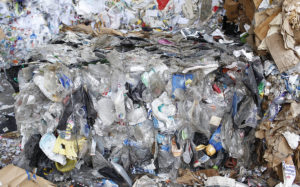Piles of displaced plastic follow China’s ban on the importation of recyclable plastics
According to a new study from University of Georgia researchers, an estimated 111 million tons of displaced plastic waste will pile up across developed nations by 2030 due to a ban on the export of most plastic waste to China. The country welcomed plastic waste from other nations for decades, turning “trash to gold” by recycling the scrap into salable goods. Over a period of 26 years, China accepted 45% of the world’s total recyclables, and, in 2016 alone, 14.1 million metric tons of plastic was shipped to China from other developed nations for this process.
Last July, China informed the World Trade Organization that it would no longer import certain types of recyclable used products, citing pollution caused from large plastic-processing plants as a major reason. Additionally, China determined that much of the imported trash in recent years has been single-use plastics – plastic bags, bubble wrap, bottles – which are both low in value and quality when reproduced.

The new restrictions, which went into effect on January 1, 2018, cover 24 kinds of solid waste, including plastic found in bottles and unsorted paper, and set a limit on the import of recyclables “contaminated” with impurities such as leftover food. To be accepted, each load must be less than .5% contaminated. This is widely considered to be very strict as it is far below the current industry standard of 3%.
Western nations have already felt the impacts of the regulations. Prior to the ban, the European Union and the United States were two of the largest exporters of recyclable scrap to China. Backups of trash at disposal sites that used to export to China have been recorded in the US, Canada, Ireland, Germany, the UK, and other European nations.
Waste and recycling company E.L. Harvey’s single-stream sorting plant in Hopkinton, MA, has 3,000 one-ton bales of mixed paper with nowhere to go.
“We’ve got a building full. We have trailers full,” said Ben Harvey, president of the company. “We are pretty much maxed out with our storage capacity; we don’t want to store material that doesn’t have a market.”
The United States and several other countries, including Thailand and Vietnam, have plastic waste processing units. However, they do not currently have the equipment and resources to process the load that China’s ban has left.
“Without bold new ideas and system-wide changes, even the relatively low current recycling rates will no longer be met,” said Jenna Jambeck, a co-author of the University of Georgia’s study, “our previously recycled materials could now end up in landfills.”
An overall decrease in the use of single-use plastics would mitigate the effects of the new restrictions. According to a recent United Nations report, 50 nations around the world, including Ireland, Morocco, and Austria have started to regulate the use of plastic bags and other non-biodegradable products through taxes, levies, and increased public awareness. Additionally, the report identified other viable biodegradable materials that could replace plastic, including Abaca hemp derived from an inedible banana, and Zein from maize protein.
Although the United States as a whole has yet to launch a single-front effort, cities, states, and corporations around the nation have begun to implement programs against single-use plastics. A few examples include the prohibition of lightweight plastic bags in California and Hawaii, and the barring of single-use Styrofoam containers in New York City. Perhaps China’s ban could provide a wake-up call for change in the use of environmentally harmful single-use plastics.
Resources and further reading:
Scientists calculate impact of China’s ban on plastic waste imports – UGA Today
A giant wave of plastic garbage could flood the U.S., a study says – The Washington Post
China Notifies WTO of Intent to Ban 24 Types of Solid Waste Imports – Waste 360
Plastics Pile Up as China Refuses to Take the West’s Recycling – The New York Times
Mountains of paper stacks up at E.L. Harvey after China says no more – MetroWest Daily News
Single-Use Plastics: A Roadmap for Sustainability – UN Environment
